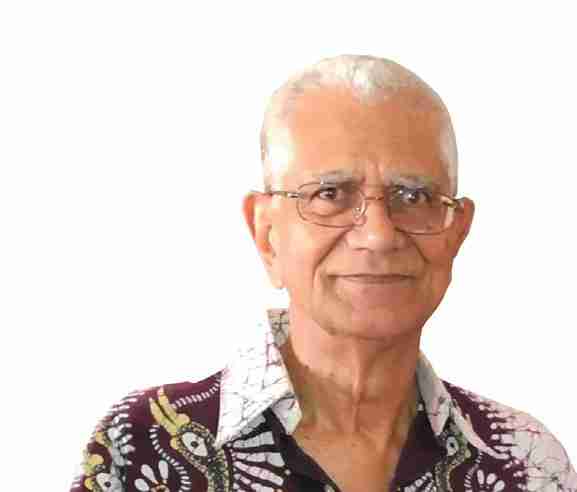“Oil “don’t spoil,” the late Eric Williams, prime minister of petroleumrich Trinidad and Tobago, was reported to have once said. To which the late Forbes Burnham, then prime minister of agriculture-oriented Guyana, retorted, “But you can’t eat it.”
What happens when you have both oil and food? Lots of headache.
Tension between the two Caribbean Community (CARICOM) nations has existed for decades, even though Trinidad and Tobago once wrote off a US$400 million debt Guyana owed for petroleum products, according to former Guyana Parliament Speaker Ralph Ramkarran.
Many Guyanese traveled to other CARICOM countries to live and work in the 1970s and 1980s, “creating monumental chaos” during transit at Trinidad’s Piarco International Airport “with huge bundles packed with goods being brought back to Guyana for trading,” Ramkarran wrote in a Guyanese Online column. “No single Guyanese passing through Trinidad during this era, and even much later, has not experienced surly, enhanced scrutiny and less than accommodating reception at Trinidad’s Immigration and Customs desks.”
Such treatment produced “a strong undercurrent in Guyana of resentment against what is believed to be Trinidad’s historically unflattering view of Guyanese, due, it has always been believed, to Trinidad’s sense of its own superiority by virtue of its oil wealth as against Guyana’s relative poverty.”
That poverty is fast disappearing following the discovery offshore Guyana of more than 13 billion barrels of crude oil and 32 trillion cubic feet of natural gas. Petro-dollar income could reach US$200 billion through 2050 – for a country whose government revenues totaled US$1.4 billion in 2018, Zainab Usman, director of the Africa Program at the Carnegie Endowment for International Peace, in Washington, D.C., has estimated, OilNow reported.
Guyana’s Vice President Barrat Jagdeo acknowledged at a recent news conference that Guyanese had indeed being treated in a “subservient way” but he and President Irfan Ali have been focusing not on retaliation but on a major agricultural expansion plan in partnerships with other CARICOM states. The goal is to reduce CARICOM’s food imports from outside the region by 25 percent by 2025, the so-called the “25 by 2025” initiative. Guyana will provide the land and other countries “can bring in the investment, so that we can catalyze that land in increasing food production,” Ali said.
The plan will be discussed at an Agri-Investment Forum and Expo in Guyana on May 19-21 “so we can highlight our competitive advantage, which is fresh water, arable lands and, of course, we have lands in the immediate savannahs and hinterland communities that we are now looking at,” Ali said, according to Guyana Times.
He has also called for a joint meeting of the CARICOM Agricultural Ministerial Task Force and the Central American Agricultural Council (SICA), Demerara Waves reported.
Also, Guyana will host the 38th Food and Agriculture Organization (FAO) Regional Conference for Latin America and the Caribbean in 2024. The FAO is the specialized agency of the United Nations that leads efforts to counter hunger and improve countries’ nutrition and food security.
So much for agriculture. The oil sector is another matter. Last December, Guyana passed a “local content” law requiring that that Guyanese nationals and companies be given priority in the procurement of goods and services in 40 areas. The Opposition complained that the law was rushed through Parliament but Natural Resources Minister Vickram Bharat said that the government wanted “Guyanese landlords to be able to rent their accommodation, we want Guyanese welders to be able to get welding business, we want Guyanese accounting firms to get accounting business…,” OIlNow reported.
But the law raised concern in the region because it was being seen as protectionism incompatible with the Treaty of Chaguaramas establishing CARICOM. That, in turn, brought into question Trinidad and Tobago’s “numerous non-tariff barriers which unfairly restrict the entry of Guyana’s goods to Trinidad,” Ramkarran wrote in his column.
Some Guyanese have suggested that Guyana should respond by quitting CARICOM. Parliamentarian Sanjeev Datadin said that would ensure Guyanese companies and individuals were not marginalized in the oil and gas sector by other CARICOM nationals, OIlNow reported.
Timothy Tucker, president of the Georgetown Chamber of Commerce and Industry, criticized the CARICOM Private Sector Organization (CPSO) for challenging the legality of the local content law. Guyanese should be given a chance to build their capacities and first consideration for opportunities to benefit from their oil resources, Tucker said. The issue was about “how Trinidad as a country has manipulated CARICOM and taken advantage of the entire region and nothing can be done about it,” he said.
But Carl Greenidge, former Minister of Foreign Affairs and Minister of Trade, rejected any call for Guyana to abandon the regional grouping which it helped to create. After the United States and Canada, the Caribbean was Guyana’s most important export market. Shutting itself out of that market would adversely affect the long-term prospects of its key industries and frustrate any effort to diversify away from petroleum products.
Greenidge, currently the government’s Advisor on Borders, noted also that Guyana needed the CARICOM’S continued support over Venezuela’s more than century-old claim to twothirds of its 83,000-square-mile territory. That dispute is now before the International Court of Justice.
Ramkarran said there was “little danger” of Guyana’s leaving CARICOM but he cautioned that “the danger of allowing negative voices on this issue to grow and fester and perhaps eventually dominate debate on this matter is dangerous.”
As if that is not enough, several Barbadian activists wrote to Prime Minister Mia Mottley on March 27 raising concern about the possibility of oil spills and the impact they would have on tourism and fisheries, Stabroek News reported. “We draw to your attention the limited capacity in the Guyanese regulatory bodies to exercise oversight of the offshore oil industry, which imperils the entire Caribbean,” the activists said. They urged Motley to convene a meeting of CARICOM leaders and experts to assess the risks posed by what they called the “reckless pace” of Guyana’s oil production.
Yeah, uneasy lies the agricultural head that wears a petroleum crown.













No Comment